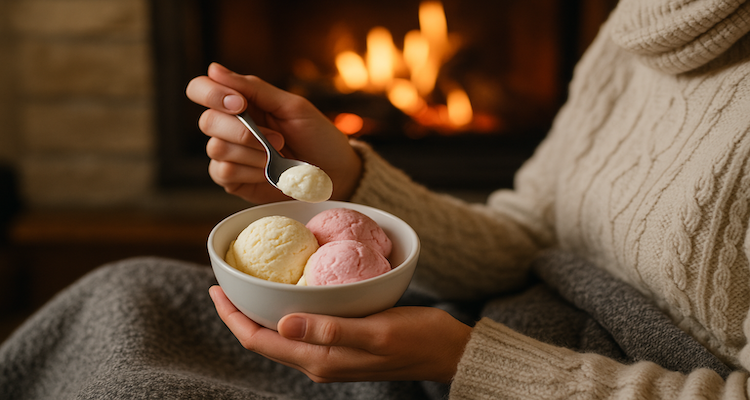Does Ice Cream in Winter Harm Your Body? The Chilling Truth Revealed

Is eating ice cream in winter bad for your health? Here’s what science says about the “warming effect,” digestion, and the best season to enjoy your favorite dessert.
The Chilly Delight That Divides Opinions
As the cold winds sweep through the season, most people reach for steaming soups and hot chocolates. Yet, many still find joy in a bowl of ice cream even as temperatures drop. For years, debates have swirled around whether eating ice cream in winter is harmful or if it has a so-called “warming effect.” Some believe it can trigger colds and throat infections, while others see it as harmless indulgence. What’s the truth behind this wintertime dilemma?
Ice Cream Beyond the Seasons
Ice cream isn’t bound by the weather. Market studies show that consumption remains consistent year-round, suggesting emotional satisfaction often outweighs climate concerns.
In traditional wellness systems like Ayurveda, foods are classified by their effects on body temperature and energy. Ice cream is considered a “cooling” food that can calm excess body heat but may disturb balance in cold weather. Modern nutrition, however, examines physical responses such as metabolism, digestion, and immune function rather than thermal energy concepts.
Both views share one idea: the body reacts differently to cold foods depending on the season and a person’s overall health.
What Happens When You Eat Ice Cream in Winter
When you eat ice cream, your body immediately works to normalize its temperature. This process slightly increases metabolism for a short period, creating the illusion of warmth hence the popular claim that ice cream has a “warming effect.” While this reaction is real, it’s minimal and temporary.
The Cold Truth About Immunity
Contrary to popular belief, eating ice cream doesn’t directly cause colds or sore throats. Viral infections, not temperature, are responsible for those illnesses. However, cold foods can irritate the throat’s lining, especially in dry winter air or when the immune system is weakened.
Digestive and Energy Response
In colder months, digestion naturally slows as the body conserves heat. Consuming very cold foods may challenge this process, sometimes leading to discomfort or indigestion. People with sinus issues, asthma, or chronic throat sensitivity might experience more noticeable effects. For others, moderate consumption poses little risk.
What Health Studies Reveal
Medical research indicates that the relationship between cold foods and illness is often overstated. While extreme temperature contrasts can cause mild throat irritation, there’s no scientific evidence that ice cream causes respiratory infections.
Nutrition experts suggest moderation and context: ice cream eaten indoors after a meal, when the body’s core temperature is stable, is generally safe. The real issue lies in excessive intake too much sugar and fat can weaken immunity, cause inflammation, and contribute to weight gain over time.
Interestingly, studies also highlight psychological and hormonal effects. Ice cream stimulates serotonin and dopamine “feel-good” hormones that enhance mood and reduce stress. That emotional comfort may explain why many crave it during winter blues.
Myths, Habits, and Comfort
Around the world, the perception of ice cream in winter differs widely. In Nordic countries, it’s common to enjoy it year-round, even in freezing weather. Warm indoor environments make the experience pleasant, and there’s no cultural taboo attached.
In contrast, in many Asian households, elders warn against eating ice cream in winter, associating it with throat pain or “catching a chill.” Online discussions reveal a generational divide young people often mock the myth, while older generations still swear by it.
The truth lies somewhere in between. While ice cream won’t cause illness by itself, how and when it’s eaten can influence its effect on the body.
When and How to Enjoy Ice Cream Safely
So, what’s the best season to eat ice cream? The answer depends more on environment and moderation than the calendar.
-
Best Season: Summer remains ideal for natural cooling, but winter indulgence is safe indoors.
-
Best Time: After meals, when your stomach is active and your body temperature is balanced.
-
Best Way: Avoid eating ice cream immediately after stepping in from the cold or before sleeping.
The key is mindfulness. Enjoying a scoop occasionally won’t harm you, but making it a daily habit can contribute to excess calorie and sugar intake regardless of the season.
The Verdict on Ice Cream in Winter
Eating ice cream during winter isn’t dangerous for most healthy individuals. While cold desserts may irritate sensitive throats or digestion, they don’t cause illness by themselves. In moderation, enjoyed under the right conditions, ice cream can be a delightful part of winter comfort.
The idea of a “warming effect” may be more about mood than metabolism. That cozy feeling after a scoop is less about temperature and more about pleasure a reminder that sometimes, comfort food serves the soul as much as the body.
So go ahead if you’re bundled up, healthy, and in the mood, that winter sundae won’t hurt a thing.
(Disclaimer: This article is intended for informational purposes only and should not be taken as medical advice. Always consult a healthcare professional regarding your diet, especially if you have allergies or existing health conditions.)
ALSO READ: The Truth About Alcohol: Harmful Habit or Harmless Indulgence?










